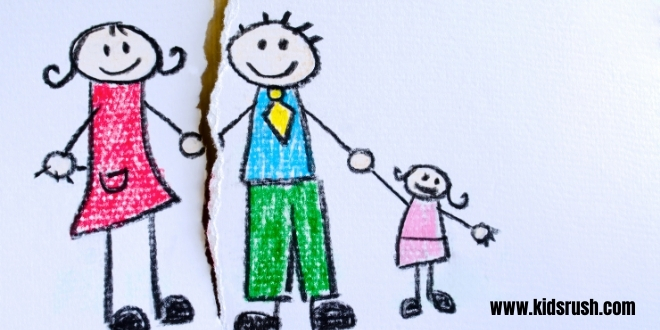How to explain divorce to children:
It is difficult to know how to talk to children about divorce. However, research has shown that speaking is helpful for them. Explaining the divorce helps them make sense of what is happening in the family.
By talking to children, adults can help them understand the tension between their parents, a parent leaving home, or the unhappiness and anger of the other.
It is common for children to think that they are somehow responsible for things that go wrong. It can be comforting for them to tell you that the parents were in trouble and that it was not their fault.
Explaining divorce to your children can answer some of these questions. Explanations can also help answer questions that children don’t even know how to ask.
Remember that divorce is confusing for children. The first time you talk to them, only include the most important and immediate topics. Children need to know that their basic needs will be met. They need to know that someone will still make breakfast in the morning, read books with them, and tuck them in bed at night. [1]
Kids also need to know that their association with both parents will proceed, if possible.
How you should explain divorce to your children
Explain that they are not guilty
Tell the kids that the divorce is not their guilt. Many children who are 4 or 5 years old or older believe that divorce is the result of something they did. For example, some children may think that the parents are divorcing because the child misbehaved or received poor grades in school. Children need to be told over and over again that they are not to blame for the divorce.
Explain that the divorce is permanent
Make it clear to the children that the parents will never be together again. Children need to know that they cannot rescue or restore the marriage. At some ages, children can also make up stories about their parents getting back together. It’s okay to pretend, but explain that the parents are separated. This can help children move on and accept the changes that may come into their lives.
Explain that parents’ love for them will not change

Help children understand that the love shared between a parent and child is special. It is different from the love shared between husband and wife. Husbands and wives can divorce, but parents are always parents. Children need to know that their parents’ love for them will last.
Helps balance relationships
Help children understand that dealing with both parents is going to be confusing. It can be difficult to love both at the same time when parents don’t love each other. Tell the children that it is okay to love both Mom and Dad.
Children should not feel like they have to take a side or worry about losing a parent’s love. After a divorce, the loyalty of children can be divided. They may feel trapped between parents. Although a parent cannot ask their child to stop loving their former partner, children may feel like they have to choose one parent over the other.
Many children take a long time to work through feelings of divided loyalty. This is a normal process for children to adjust to their parents’ divorce.
Give the children time to think about the divorce and the changes it may have caused. Don’t wait for a single big discussion. Speak as many times as necessary.
Children want to talk about different topics over time. Answer children’s questions and concerns, and listen to what they say.
Tips to explain divorce to your children

It is clear that as a father and mother you must help your child to face the divorce, for this we give you some very direct suggestions for when you have to explain to your children that their parents are getting divorced are :
- Keep explanations simple. Appropriate to the child’s age and development.
- Focus on the immediate concerns of children.
- Avoid blaming either parent.
- Avoid talking about details. Use general statements. These statements can be very helpful: “Mom and Dad have decided they would be happier living in different houses”; “Mom and Dad have decided not to live together in the same house.”
- It is better to avoid saying, “Mom and Dad don’t love each other anymore.”
If the parents talk about not loving each other anymore, a child may fear that he too will lose parental love if he misbehaves.
- Listen to the child’s questions. Find out what you already know.
- Avoid giving false hope that the parents can get back together.
- Keep clarifying the children by saying that divorce is not their fault.
Questions children ask
Children need time to adjust to the idea of divorce. They may have many questions about what divorce means.
- Are they going to see the parents?
- Are they going to live in the same house or go to the same school?
- Who will take care of them?
- Are they going to see their friends?
- Can parents divorce their children or stop loving them too?
- Could the parents stay together if the children “had been good”?
